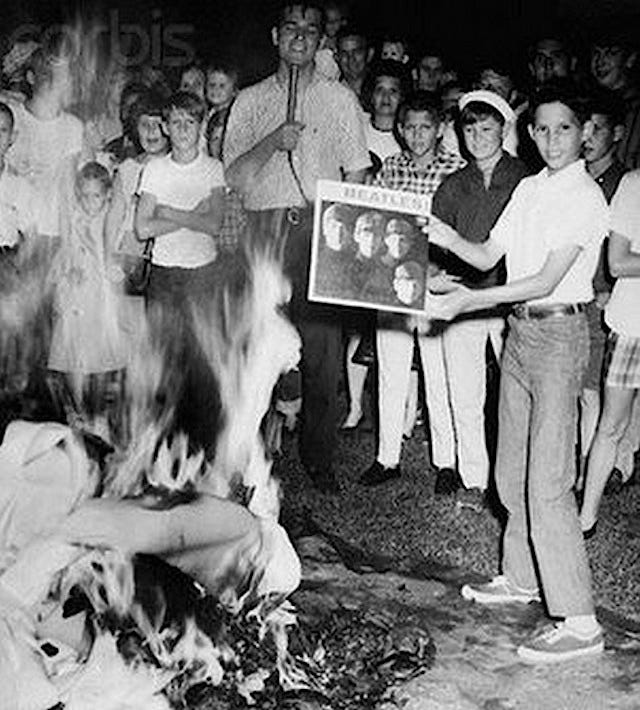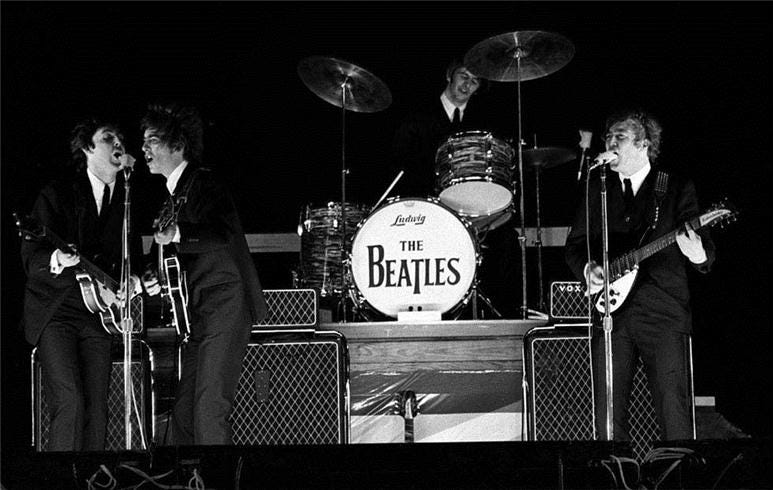The Beatles in Alabama?
Today is June 18, 2024, and is the 82nd birthday of Paul McCartney. I think he’s way past When I’m Sixty-Four at this point. Heck, this time next year, I’ll be past When I’m Sixty-Four myself. The Beatles were only together as a band called The Beatles for 10 short years (1960-1970). Even though they originally formed under different names beginning in 1956 and weren’t legally dissolved by the courts until 1974, they were only a functional recording “band” for 8 of those years, releasing 13 studio albums between 1963 and 1970. Here’s a bit of useless trivia - 1964 was the only even-numbered year when The Beatles released two albums, although all of the odd-numbered years featured two albums each. Two in 1963, two in 1964, two in 1965, one in 1966, two in 1967, one in 1968, two in 1969, and one in 1970. I told you it was useless.
The Beatles already had three #1 hits in England before ever releasing any singles into the American market. It started with I Want to Hold Your Hand in January, 1964, which went straight to #1 in America in early February, and they never looked back after that. In fact, George Harrison once admitted that they expected it to be much tougher to break into the American market, and were taken totally by surprise at how easy it was.
In the 1960’s, the main purpose for releasing singles was to get the songs played on the radio which would entice fans to buy tickets to the concerts. Public performance was still the most lucrative activity for any musician in the 60’s, and The Beatles not only dominated the touring circuit, but totally rewrote the rules. Prior to The Beatles, the standard performance contract required the band to choose between a flat fee for appearance or a percentage of the ticket sales. The highest paid entertainer in America in 1964 was Frank Sinatra, who commanded $10,000 per show. By the end of 1964, The Beatles were guaranteed $40,000 per show ($10,000 apiece), PLUS a percentage of the ticket sales! They were the first significant act to get BOTH. Their tours were extensive and their concerts were massive. In fact, they were so big that their manager Brian Epstein got the idea to try and sell out an entire stadium in America, and after the huge success at New York’s Shea Stadium in August, 1965, they ONLY played stadiums after that. If you’ve ever been to a concert at a stadium, you owe that to The Beatles.
Here’s some more trivia, but maybe not so useless this time - The Beatles only played concert tours between 1963 and 1966. Although they toured extensively around the world during those few short years, they only played three tours in America - 1964, 1965, and 1966. So, as the title of this post inquires, did The Beatles ever play a show in Alabama?
As co-owners of several radio stations in the South (Montgomery, Birmingham, Jacksonville, and Chattanooga), brothers Bill, Cyril, and Dan Brennan were interested in bringing The Beatles through their listening areas on their various concert tours. The first true concert tour for The Beatles in America took place in the late-summer and early-fall of 1964, and there was a major problem with the promotional aspects of the bookings for that tour. It seemed that The Beatles refused to play any concert venue that couldn’t guarantee non-segregated seating. The Brennan Brothers, who owned WBAM in Montgomery, came within an eyelash of booking The Beatles to play in Garrett Coliseum in Montgomery, but the best they could do was promise that THEY wouldn’t do anything to segregate the venue seating. Many Southern states still had Jim Crow laws on the books that prevented integrated seating at public gatherings, and even though the Civil Rights Act was signed into law in July of 1964, it came too late to finalize the booking. Therefore, The Beatles passed on what would have been two concerts in Alabama (Montgomery and Birmingham). In fact, the only concerts they gave anywhere in the Deep South that year were in New Orleans, Dallas, and at the Gator Bowl in Jacksonville (sponsored by those same Brennan brothers). Oddly enough, Hurricane Dora hit Jacksonville (the first hurricane to ever do so) the day before The Beatles concert. The Brennan Brothers’ Jacksonville station, WAPE (The Big Ape), lost power and could not effectively promote the concert, while their rival stations in the area kept broadcasting (spitefully and incorrectly) that the concert had been canceled. The night The Beatles took the stage at The Gator Bowl in Jacksonville, the steady winds were still blowing at 45 miles per hour, and Ringo’s drum platform had to be nailed down to the stage. The other Beatles were forced to lean forward at severe angles to prevent being blown off the stage. All in all, due to storm displacement and negative publicity, only about two-thirds of the ticket-holders actually showed up for the Jacksonville performance. And they thought THAT was a storm…
I once spoke with one of Cyril Brennan’s daughters, Donnie Kay, about those times, and she said her sister Diane still has crumbs she saved from a potato chip bowl shared by The Beatles during their press conference in Jacksonville. Such a treasure!
The next year, during the summer of 1965, The Beatles returned to the United States for another tour. However, local promoters failed again to bring them to Alabama, and the only concert stops for The Beatles in the Deep South that year were in Atlanta and Houston. In 1965, while the rest of America struggled with the suffocating and engulfing nature of The British Invasion on the radio, the South managed to hold on to Southern artists as chart-toppers in regional markets supported by independent and locally-owned radio stations. Nationwide radio rankings typically revealed that nine out of ten Top 10 hits during several weeks of 1965 were held by British Invasion acts. However, down here, we were still devoting significant airtime to our own fellow Southerners, such as The Righteous Brothers, Wilson Pickett, James Brown, Otis Redding, The Swingin’ Medallions, Johnny Rivers, Billy Joe Royal, Bobbie Gentry, The Tams, The Gants, and Roy Orbison in spite of the influence of The Beatles. And speaking of Roy Orbison, I’ll never forget the Yankees who lived in our neighborhood on Fontaine Drive in Auburn trying to learn to pronounce “PURR-ty WOE-mun,” and “MER-say.” It was priceless.
By late 1966, the explosive nature of Civil Rights in the South receded back down a bit, and things looked promising for The Beatles to finally play a concert in Alabama for their summer of ’66 tour. At least until John Lennon opened his big fat mouth.
It was trendy in England at that time to knock organized religion, and John Lennon jumped on the bandwagon in an interview with London’s Maureen Cleave when he stated that “…right now, The Beatles are more popular than Jesus.” It was intended as a light-hearted jab at the dwindling popularity of organized religion in England, and if you add the word “even” right before the “The Beatles,” you can kind of get an idea for what Lennon was going for. In England, they got the joke, and nobody seemed offended when the interview was printed and released. Church attendance was way down in England at the time, so he wasn’t wrong. In the United States? Different story.
When the article was released in America in July, 1966, the immediate howls of outrage became deafening, and nowhere more so than the Bible Belt of the Deep South. Although all of us in my family were huge Beatles fans at the time, Lennon’s quote split the family right down the middle. For as long as he lived, I don’t think my father ever forgave John Lennon for the quote, and although he respected my individuality enough to allow me to continue on as a Beatles fan, he always made it clear to me exactly how he felt about what Lennon said. When Birmingham got involved, my sisters took it a step further.
As the ferocity barreled across the South, two radio personalities on WAQY in Birmingham named Tommy Charles and Doug Layton took charge. They organized a coalition of outraged stations across Alabama that refused to play any more Beatles music due to Lennon’s quote. Their goal was to completely remove The Beatles from the airwaves in Alabama, and although it didn’t ultimately succeed, it did generate a lot of nationwide publicity. Layton and Charles called their campaign “Ban The Beatles,” and they encouraged listeners to send all of their Beatles albums and paraphernalia to Birmingham to be destroyed. My sisters, bless their hearts, rounded up everything they had with “Beatles” on it and sent it off to Birmingham. I watched Beatles albums, magazines, dolls, songbooks, etc. packed up and sent away. I hated to see it go, but I still respect their Faith and commitment.
Most of that entire concert tour was a disaster from start to finish due to the firestorm of negative publicity. Lennon tried to manufacture an apology for American audiences to rescue the tour, but his heart clearly wasn’t in it, and that only made it worse. Although The Beatles only played one show in the South during that tour (Memphis), fans boycotted them across the country wherever they played. Some fans threatened to shoot them if they appeared onstage, and the local police forces in various cities were also outraged at Lennon and refused to promise adequate police protection at the venues. Many scheduled shows on that tour had to be canceled either for threats or for dismal ticket sales. By the time The Beatles finally got to the last concert stop in San Francisco’s Candlestick Park in August, they called it quits. Permanently. After that disastrous tour finally ended, The Beatles never took the stage together anywhere again.
Even though all four of The Beatles went on solo tours after the break-up (Paul McCartney continues to do so as of this writing), none of them either together OR as solo artists EVER came to Alabama. They still avoid us. Laura has surprised me twice with tickets to see Paul in concert, but both shows were in Atlanta.
So, follow me down the rabbit hole. John Lennon admitted that his controversial statement directly caused the disaster of the 1966 American tour to snowball as fueled by the vicious outrage in Alabama. The disastrous nature of that 1966 tour caused The Beatles to stop touring entirely. Once they stopped touring, they started going in separate directions, and stopped functioning as a “band.” Even though the most brilliant music of their career came after they stopped touring, their separate drifts soon led to a permanent break-up of the band.
So the last bit of useless trivia is that it wasn’t Yoko that broke up The Beatles - it was Alabama.






